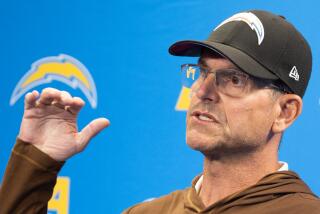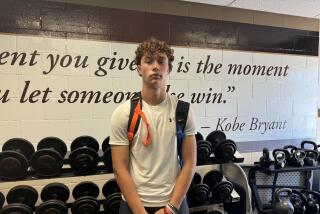Florida State Vows: No More Deion Sanderses : School Responds to Magazine Story on Football All-American’s Academic Failure, Disinterest
- Share via
TALLAHASSEE, Fla. — Deion Sanders’ academic legacy will never be repeated at a Florida college, a state university spokesman said today in response to a magazine story critical of college football.
This week’s edition of Sports Illustrated reported that Sanders had no interest in college and that Florida State officials turned their heads when the All-American cornerback didn’t attend class last year.
Sanders was allowed to play in the Sugar Bowl last January even though school officials knew he had flunked all of his fall courses.
The magazine article implied that university President Bernard Sliger defaulted responsibility, leaving Sanders’ academic participation in the hands of former Athletic Director C. W. (Hootie) Ingram, who has since moved to Alabama.
‘Terrible Image Problem’
“I’ll let the athletic director handle the matter . . . just as I would let the dean of any other school handle a similar situation,” Sliger told the magazine, which asked rhetorically if Ingram was the dean of the School of Football.
Gus Turnbull, provost at Florida State, noted that the university changed its policy on academic requirements after the Sanders’ case became public.
“The real key, I think, is that we changed the requirement after we learned of the problem,” Turnbull said. “It was a terrible image problem and we’re sorry it happened.”
Earlier this year, the state university system’s board of regents enacted a new regulation dubbed the Sanders rule that forbids schools from allowing athletes to play in post-season games if they don’t attend class or fail to pass the minimum number of hours.
“Obviously we’ve had to react to the actions of a single athlete with a rule that applies to every athlete,” said Patrick Riordan, state university system spokesman.
Sanders told the magazine that college football was about money and that he had to be in college to prepare for the National Football League.
Sanders’ presence on campus indicated to the student body, fans and critics the extremes to which a school will go to produce a winning football team, the magazine said.
More to Read
Go beyond the scoreboard
Get the latest on L.A.'s teams in the daily Sports Report newsletter.
You may occasionally receive promotional content from the Los Angeles Times.










